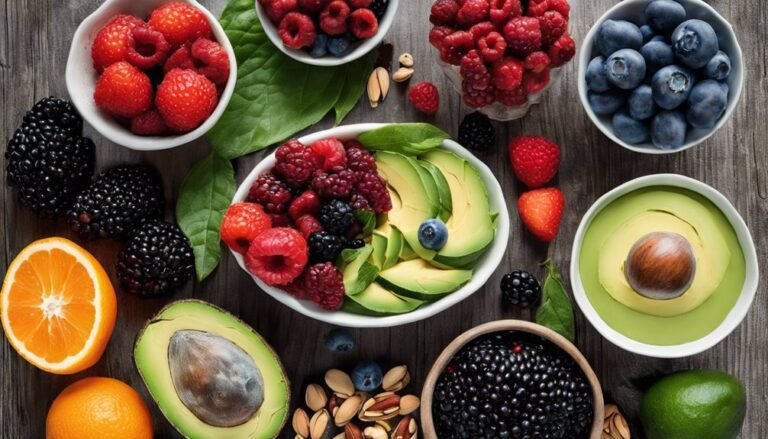Introducing a Healthy Diet for Mom and Baby
When Sarah began incorporating more leafy greens, lean proteins, and whole grains into her diet during pregnancy, she noticed an increase in her energy levels and a decrease in pregnancy-related discomfort. Curious to learn more about the benefits of a healthy diet for both you and your baby? Unveil the secrets of nourishing your body and supporting your baby's growth with simple yet effective dietary strategies tailored to this transformative phase of life.
Benefits of a Healthy Diet
Ensuring a healthy diet during pregnancy is crucial for both you and your baby. Pregnancy nutrition plays a vital role in the development and well-being of your little one. Healthy eating habits not only support your baby's growth but also contribute to your overall health during this important time.
Consuming a nutritious diet rich in essential vitamins and minerals like folic acid, iron, calcium, and omega-3 fatty acids can help prevent birth defects, support healthy fetal development, and reduce the risk of complications such as preterm birth or low birth weight.
Additionally, maintaining a balanced diet can help you feel more energized, reduce discomforts like constipation and nausea, and support your body as it goes through the incredible journey of pregnancy.
Nutrient-Rich Foods to Include
To support a healthy pregnancy, incorporating nutrient-rich foods into your daily meals is essential. Ensuring you consume a variety of superfood options and maintaining balanced plate suggestions can provide you and your baby with vital nutrients. Here are some examples of nutrient-rich foods to include in your diet:
| Food Group | Superfood Options | Balanced Plate Suggestions |
|---|---|---|
| Fruits | Berries, Oranges | Add fruits to breakfast or as a snack |
| Vegetables | Spinach, Sweet Potatoes | Include vegetables in lunch and dinner |
| Protein | Salmon, Lentils | Opt for lean proteins in each meal |
| Whole Grains | Quinoa, Brown Rice | Choose whole grains for fiber and nutrients |
| Dairy | Greek Yogurt, Cheese | Incorporate dairy for calcium and protein |
Foods to Avoid During Pregnancy
For a healthy pregnancy, it's crucial to be mindful of the foods you consume. Pregnancy cravings can sometimes lead you to foods that may not be the best choice for you and your baby. It's important to be aware of dietary restrictions during this time to ensure optimal health for both of you.
Certain foods should be avoided during pregnancy to minimize potential risks. These include raw or undercooked meats and seafood, unpasteurized dairy products, and deli meats that may contain harmful bacteria. High-mercury fish like swordfish and shark should also be limited, as mercury can be harmful to the developing fetus.
Additionally, it's best to steer clear of alcohol and limit caffeine intake, as they can have negative effects on the baby. Soft cheeses, like brie and feta, should be avoided due to the risk of listeria.
Importance of Hydration
Staying well-hydrated is essential for both you and your baby during pregnancy. Adequate water intake plays a crucial role in supporting the health and development of your little one while helping you feel your best. Hydration during pregnancy is vital as it helps maintain the amniotic fluid levels, supports the increased blood volume, and aids in digestion and preventing constipation.
To ensure you are staying hydrated throughout your pregnancy, aim to drink at least 8-10 cups of water per day. However, individual needs may vary, so listen to your body and increase your intake if you feel thirsty or are experiencing symptoms of dehydration such as dark urine or dizziness. Remember, water is the best choice for hydration, but you can also include hydrating foods like fruits and vegetables in your diet.
| Benefits of Hydration during Pregnancy | |
|---|---|
| Maintains amniotic fluid levels | Supports increased blood volume |
| Aids in digestion | Prevents constipation |
Meal Planning Tips
Ensuring a well-balanced diet is key to supporting both your health and your baby's development during pregnancy. Meal planning can help you achieve this by making sure you have nutritious options readily available. Start by creating a grocery list that includes a variety of fruits, vegetables, whole grains, lean proteins, and dairy products. When grocery shopping, stick to the perimeter of the store where fresh produce and proteins are typically located to avoid the temptation of processed foods.
Portion control is also essential during pregnancy. Aim to fill half your plate with fruits and vegetables, one-quarter with whole grains, and one-quarter with lean protein. This guideline can help you maintain a healthy weight and ensure you're getting the nutrients you and your baby need.
Additionally, consider using smaller plates to help control portion sizes and prevent overeating.
Healthy Snack Ideas
When it comes to maintaining a healthy diet during pregnancy, incorporating nutritious snacks throughout the day can help keep you energized and satisfied.
Nutritious smoothies are a fantastic option that can provide essential vitamins and minerals. You can blend together fruits like berries, bananas, and spinach with some Greek yogurt or milk for a delicious and refreshing snack.
Energy-boosting nuts are also a great choice to keep on hand. Almonds, walnuts, or cashews are packed with protein, healthy fats, and fiber, making them a satisfying and nourishing snack to curb hunger between meals. Try mixing nuts with some dried fruits for a balanced and tasty trail mix.
These snack ideas provide a good balance of nutrients to support both you and your baby's health during pregnancy. Remember to listen to your body's hunger cues and choose snacks that will keep you feeling your best throughout the day.
Managing Pregnancy Cravings
To effectively manage pregnancy cravings, it's important to understand the underlying reasons behind these urges and how to make healthier choices that benefit both you and your baby. Cravings during pregnancy can be intense, but there are ways to navigate them without compromising your health or your baby's development. Here are some tips to help you manage pregnancy cravings:
- Craving alternatives: Instead of giving in to unhealthy cravings, try to find healthier alternatives that satisfy your cravings while providing essential nutrients. For example, if you're craving something sweet, opt for fresh fruits or a small piece of dark chocolate.
- Understand emotional eating: Sometimes, cravings can be triggered by emotions rather than actual hunger. Take a moment to assess if you're eating due to hunger or as a response to stress, boredom, or other emotions. Find healthy ways to cope with emotions instead of turning to food.
- Seek support: Talk to your healthcare provider or a nutritionist if you're struggling with managing your cravings. They can provide guidance and support to help you make healthier choices for you and your baby.
Supplements for Mom and Baby
For optimal health during pregnancy and beyond, incorporating supplements into your diet can be beneficial for both you and your baby.
Prenatal vitamins are essential during pregnancy as they provide key nutrients like folic acid, calcium, and iron that support your baby's development and help prevent birth defects.
Probiotics can also be beneficial for maintaining a healthy gut microbiome, which can impact your overall health and potentially reduce the risk of certain conditions such as gestational diabetes.
Omega-3 fatty acids are crucial for brain development in your baby and can also help reduce the risk of preterm birth. Including sources of omega-3s like fish oil or algae supplements in your diet is important.
Iron is another vital mineral during pregnancy as it helps prevent anemia, which can lead to fatigue and other complications. Make sure to discuss with your healthcare provider to determine the right supplements and dosages for you and your baby's specific needs.
Eating Well Postpartum
Consider prioritizing your nutrition postpartum to support your recovery and overall well-being. After giving birth, your body needs adequate nourishment to heal and regain strength. Here are three essential tips for postpartum nutrition and healthy eating habits:
- Hydrate: Drink plenty of water throughout the day to stay hydrated, especially if you're breastfeeding. Water helps with milk production, aids digestion, and supports overall bodily functions.
- Balanced Meals: Focus on consuming a variety of nutrient-dense foods like fruits, vegetables, whole grains, lean proteins, and healthy fats. These foods provide essential vitamins and minerals necessary for your recovery and energy levels.
- Snack Smart: Opt for healthy snacks like nuts, yogurt, fruits, or whole-grain crackers to keep your energy levels steady throughout the day. Avoid sugary treats and processed foods that can lead to energy crashes.
Seeking Professional Guidance
Prioritize your health and well-being postpartum by considering seeking professional guidance on your nutrition and recovery journey. Consulting experts such as nutritionists can provide valuable insights tailored to your specific needs. These professionals can help you make informed decisions about your diet, ensuring you meet your nutritional requirements while promoting healing and overall wellness.
Medical guidance is essential for creating a personalized plan that addresses any specific health concerns or dietary adjustments you may need postpartum. Whether you're looking to lose pregnancy weight, manage a health condition, or optimize your nutrition for breastfeeding, seeking professional advice can set you on the right path towards a healthy and sustainable lifestyle.
Frequently Asked Questions
Can I Indulge in Occasional Treats During Pregnancy?
You can enjoy occasional treats during pregnancy, but aim for healthy cravings to maintain nutrient balance. Indulging in moderation is fine, but remember to prioritize nourishing foods for you and your baby's health. Opt for nutrient-dense snacks like fruits, nuts, or yogurt to satisfy your sweet tooth while still providing essential vitamins and minerals. Balancing treats with nutritious choices is key to supporting your well-being throughout pregnancy.
How Can I Combat Morning Sickness With Diet?
To combat morning sickness with diet, try natural remedies like ginger tea or peppermint. Opt for nutrient-rich options such as whole grains, fruits, and vegetables. These can help ease nausea and provide essential vitamins.
Avoid greasy or spicy foods that may trigger discomfort. Stay hydrated and try eating small, frequent meals throughout the day. Experiment with different foods to find what works best for you during this time.
Are There Specific Foods to Boost Milk Supply Postpartum?
Boosting milk supply postpartum can be aided by specific foods. Incorporate lactation cookies and galactagogues, known to enhance milk production. Ensure adequate hydration and opt for nutrient-dense foods like oatmeal, leafy greens, and lean proteins. These choices can support your body in producing ample milk for your baby.
Can I Continue Intermittent Fasting While Pregnant?
You shouldn't continue intermittent fasting while pregnant because it may not provide adequate nutrition for you and your baby. It's crucial to prioritize nutrition guidelines and ensure you're consuming enough nutrients for both of you.
Fasting safety during pregnancy is a concern, as it can potentially impact your health and the development of the baby. Consult with your healthcare provider to create a safe and healthy eating plan that supports both you and your baby's needs.
How Can I Manage Food Aversions During Pregnancy?
When managing food aversions during pregnancy, coping strategies are key. Try exploring alternative options to find what works best for you. Experiment with different foods, textures, and flavors to see what you can tolerate.
Don't hesitate to reach out to your healthcare provider for guidance and support. Remember, every pregnancy is unique, so listen to your body and prioritize your well-being during this special time.
Conclusion
In conclusion, embracing a healthy diet during pregnancy benefits both you and your baby by providing essential nutrients for growth and development. By incorporating nutrient-rich foods, staying hydrated, and avoiding harmful substances, you can set the stage for a successful pregnancy and postpartum recovery. Remember, your well-being is crucial for the well-being of your little one, so prioritize your health and enjoy the journey of nourishing both yourself and your baby.






